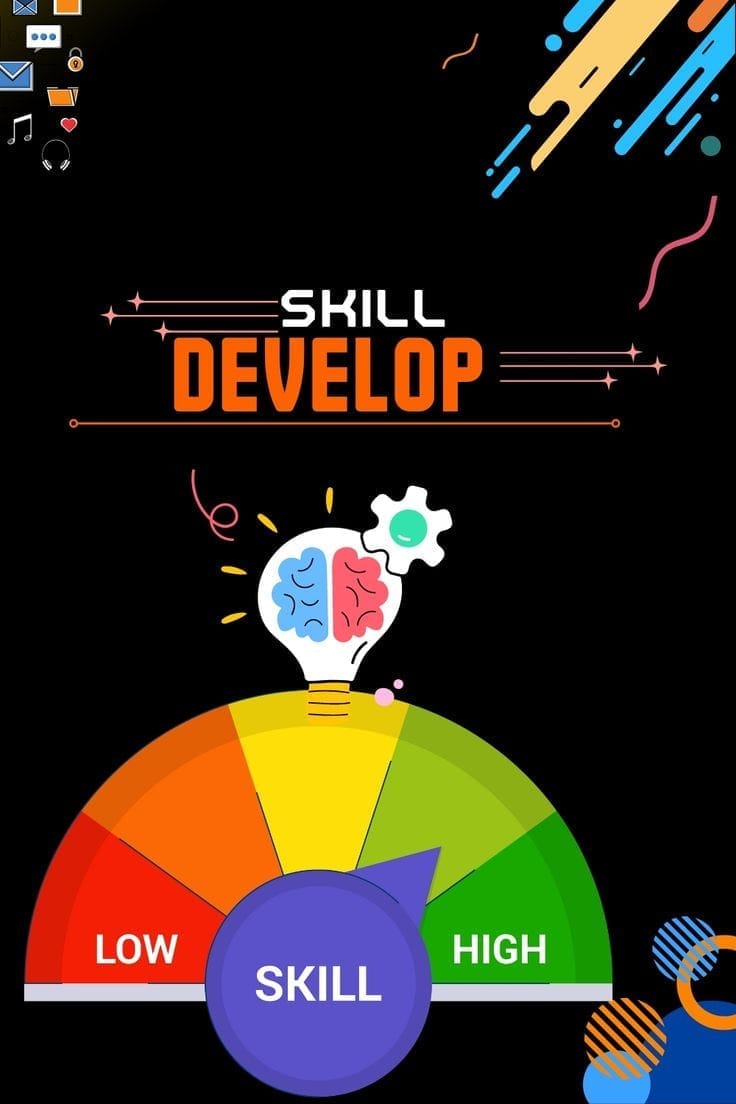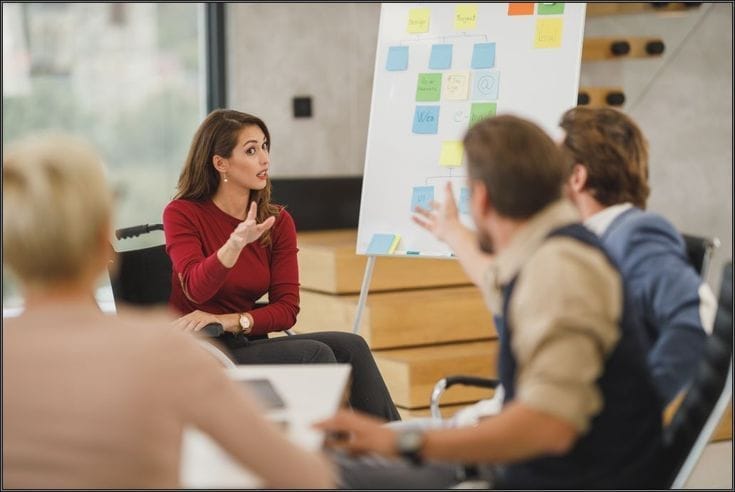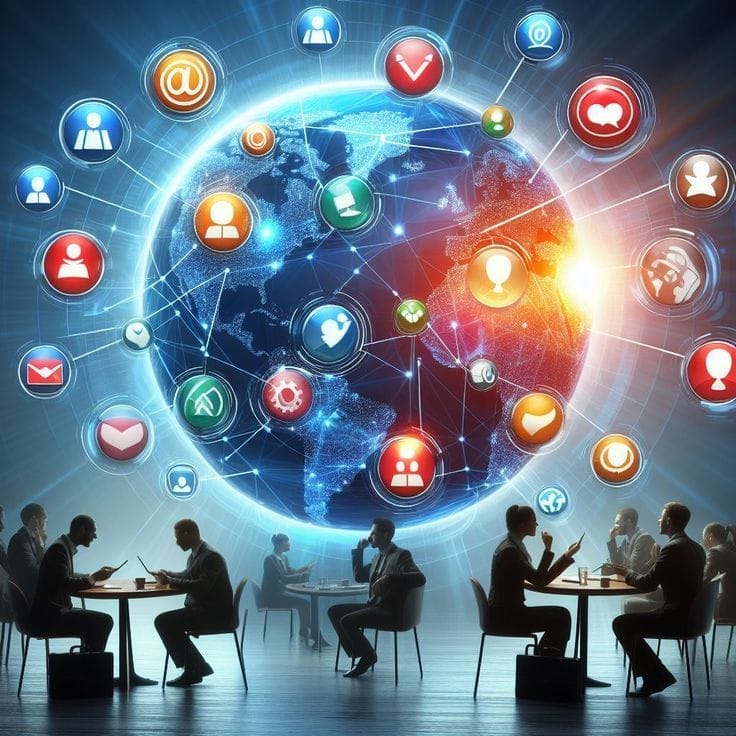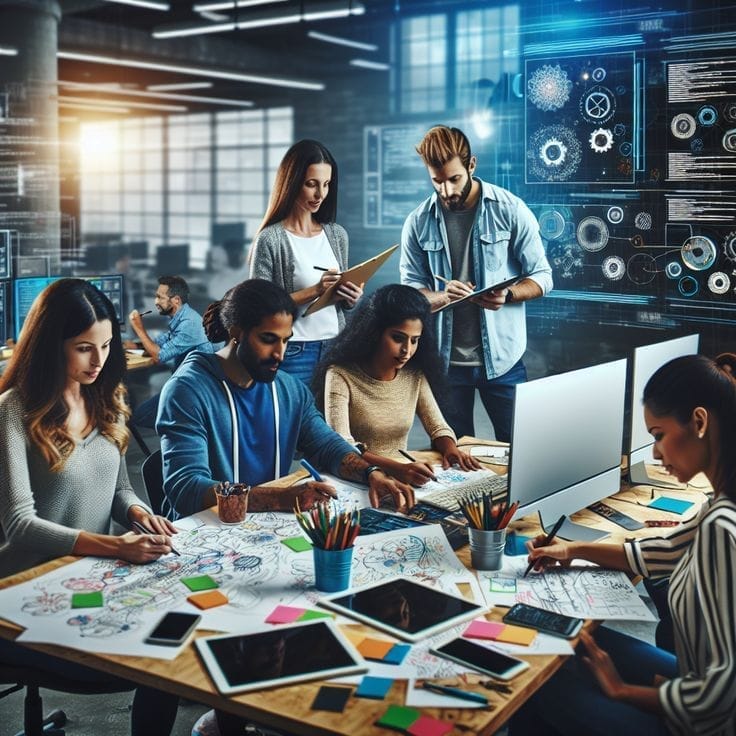LPA BLOG POST
4 BIG BENEFITS OF LEARNING NEW SKILLS.

Leadpreneur Academy

Leadpreneur Academy
Unlocking Collective Potential: The 4 Transformative Benefits of Learning New Skills
The modern era often presents a paradox: individuals may find themselves feeling stagnant, watching the world evolve at lightning speed while industries transform and once-essential skills become obsolete. This pervasive sense of change and the need for continuous adaptation is not merely a personal challenge; it is a universal human experience in our rapidly advancing society. In the 21st century, the ability to learn and adapt has become increasingly paramount, driven by rapid technological advancements, globalization, and evolving societal norms.1
This exploration delves into the profound ripple effect that personal growth through skill acquisition has on our communities and the world at large. It will be demonstrated how embracing continuous learning is a powerful catalyst for creating meaningful societal impact. The following sections will delve into four transformative benefits of learning new skills, illustrating how they cultivate personal well-being and resilience, accelerate economic growth, ignite innovation and problem-solving, and strengthen communities, ultimately shaping a more vibrant and equitable future for all.
Cultivating Personal Well-being and Resilience
Learning new skills is far more than just adding a line to a resume; it represents a significant investment in mental and emotional health. The advantages extend beyond mere cognitive enhancements to profoundly impact an individual's mental and emotional well-being, instilling strong motivation, providing renewed energy, and cultivating a deep sense of purpose.1 The very act of engaging with something new can serve as a powerful and constructive antidote to negative emotional states, such as boredom, stress, and anxiety. The novelty and inherent challenge in learning inject a fresh perspective and revitalize one’s overall outlook on life.1 This shift of attention toward constructive and rewarding activities effectively reduces stress levels and fosters a healthier mental state.
Boosting Brainpower and Mental Agility
The human brain possesses a remarkable capacity for adaptation and reorganization, a phenomenon known as neuroplasticity. Learning new skills actively triggers the formation of new neural connections and strengthens existing ones, effectively rewiring the brain’s circuitry.1 This remarkable adaptability is retained throughout the entire lifespan, underscoring the neurological benefits of continuous learning at any age.1 A critical component in this process is myelin, a white, fatty substance that insulates nerve fibers in the brain. Repeatedly practicing a new skill increases myelin density around the relevant neural pathways, which in turn facilitates faster and more efficient transmission of electrical impulses between neurons, thereby improving performance and making learning more efficient over time.1 This invigoration of the brain leads to increased white matter and enhanced problem-solving abilities.
Beyond these foundational changes, skill acquisition leads to significant improvements in specific cognitive functions. For instance, acquiring a new language or learning a musical instrument can profoundly enhance working memory (the ability to hold and manipulate information) and episodic memory (the recollection of past events).1 The demands of learning also strengthen attentional control and the ability to focus.1 Engaging in diverse learning activities has been observed to lead to a generalized improvement in various cognitive functions, suggesting a holistic strengthening of overall cognitive abilities.1 This continuous engagement is vital in reducing cognitive decline as individuals age, with research indicating that older adults who learned new activities showed improvements in cognitive scores and increased functional independence.2 Individuals who actively learn new skills are notably less likely to develop dementia.
These physiological changes in the brain, particularly the enhancement of neuroplasticity and the increase in myelin density, create a powerful positive feedback loop. This means that the very act of learning a new skill primes the brain for future learning, making subsequent acquisitions not only easier but also faster and more efficient.1 This phenomenon, often referred to as "learning to learn," reveals that the benefit extends beyond the immediate skill acquired; it builds the fundamental capacity for continuous learning itself. This meta-skill offers compounding cognitive advantages throughout one's life, reducing the perceived barrier to entry for new knowledge and making continuous personal and professional development more accessible and sustainable in a world that demands constant adaptation.
Fostering Emotional Fortitude and Purpose
The pursuit of new skills instills strong motivation, provides renewed energy, and cultivates a deep sense of purpose, particularly valuable during periods of boredom, isolation, or challenging life circumstances.1 Embracing a new hobby or skill can provide the impetus to start the day with enthusiasm and a clear objective, offering a powerful antidote to monotony.1 The novelty and challenge inherent in learning something new inject a fresh perspective and revitalize one’s overall outlook on life.
Successfully mastering a new skill significantly boosts self-confidence and fosters a profound sense of empowerment.1 As individuals develop new competencies, they often experience increased courage and a greater sense of control, which can help to mitigate feelings of fear and anxiety.1 This personal growth is essential for overall mental health, as mastery of new abilities leads to greater resilience against life's challenges.2 Research consistently suggests a direct correlation between actively engaging in learning, enhanced happiness, and overall well-being.1 Focusing on the learning process can also serve as a positive and engaging distraction, effectively reducing stress levels by shifting attention toward constructive and rewarding activities.
The journey of skill acquisition plays a vital role in fostering a growth mindset.1 By embracing challenges, persisting through obstacles, and viewing effort as a path to mastery, individuals cultivate a belief in their inherent ability to learn and improve, which has far-reaching benefits across various aspects of life.1 This process creates a self-reinforcing cycle: the psychological rewards derived from initial successes in acquiring a new competency lead to increased self-belief and motivation, which in turn encourages individuals to pursue further learning and personal development.1 This continuous loop of achievement and motivation builds a robust psychological framework that promotes sustained self-improvement and adaptability in the face of adversity, extending the impact far beyond the initial skill learned. A more confident, purposeful, and adaptable populace is inherently more resilient to societal shocks and contributes more positively to collective well-being.
Consider the experience of learning public speaking. The initial prospect can feel completely overwhelming, with knees literally shaking before any presentation. However, by taking small, deliberate steps—joining a local Toastmasters club, practicing in front of a mirror, and eventually delivering short speeches—a profound shift occurs. It is not merely about the ability to speak; it is about overcoming a deep-seated fear. That newfound confidence then spills over into every aspect of life, making one more willing to take on new challenges, both personally and professionally. This quiet transformation, born from confronting a personal fear, becomes a powerful reminder of one's own resilience and capacity for growth.
Accelerating Economic Growth and Career Advancement
In today's rapidly evolving world, continuous skill development, often referred to as lifelong learning, is not merely a personal choice; it is an economic imperative.1 It is crucial for maintaining relevance in dynamic job markets and a constantly changing society, enabling individuals to adapt to technological advancements, economic shifts, and evolving industry standards.1 The development of skills serves as a fundamental cornerstone for economic growth, particularly in the context of the ongoing green-digital transition.10 It contributes to structural transformation and economic growth by enhancing employability and labor productivity, thereby helping countries to become more competitive.
Fueling a Dynamic Workforce
A skilled workforce is directly correlated with increased overall productivity, achieved by improving efficiency and reducing the wastage of resources.11 Skilled employees can complete tasks faster and with higher precision, leading to better economic outcomes.11 Skill development programs play a vital role in creating employment opportunities by equipping individuals with industry-relevant skills, which in turn helps to bridge the skill gap and enables young people to secure jobs in diverse sectors such as manufacturing, IT, healthcare, and tourism.10 Skilled workers find employment more quickly, contributing to lower joblessness rates across the economy.
The issue of skill gaps is widely recognized as a major constraint to business transformation and economic growth globally, with 63% of employers identifying it as a significant barrier over the 2025-2030 period.10 This persistent global skill gap, exacerbated by megatrends like automation and digitalization, represents a substantial economic burden. The global economy could gain an estimated US$6.5 trillion in the next seven years by closing workers' skills gaps, a sum representing 5-6 percent of their GDP.10 This massive quantifiable impact underscores the critical necessity of skill development as a strategic national and global priority. Upskilling and reskilling initiatives are consequently prioritized by a significant 85% of surveyed employers to bridge these gaps and maintain competitiveness.13 This is not merely about job creation but about maintaining national competitiveness and resilience in a globalized, tech-driven economy.
The rapid pace of technological advancements and evolving labor markets can quickly render technical and specialized skills obsolete.10 In this dynamic environment, continuous skill development, often referred to as lifelong learning, is essential for individuals to maintain relevance in dynamic job markets. It offers numerous benefits, including enhanced job security, expanded career options, and improved cognitive health.1 Workers can expect that two-fifths (39%) of their existing skill sets will be transformed or become outdated over the 2025-2030 period.15 This is not merely a challenge but an urgent call for proactive, large-scale upskilling and reskilling initiatives. The cost of inaction, manifested in lost GDP and high unemployment, is far greater than the investment required for training.10 Consequently, governments and businesses must prioritize accessible, relevant, and quality skills development programs to ensure a robust and adaptable workforce.
Driving Innovation and Entrepreneurship
Skilled professionals are the primary drivers of technological and industrial advancements.4 Innovation skills, defined as socially determined personal capacities that add value and can be enhanced through learning and development, are crucial for developing new products, processes, organizational forms, and business models.20 These include conceptual skills (such as creativity and systems thinking), evaluative skills (like critical analysis and problem-solving), and implementation skills (such as knowledge brokering).20
Technical skills, including digital literacy, data analysis, and coding, empower entrepreneurs to make informed decisions, contribute directly to product development, and effectively reach their target audience.21 For example, a startup founder proficient in data analysis might identify emerging customer preference trends, leading to the development of innovative new product features that set their offering apart in a crowded market.21 Skill training further empowers individuals to start their own businesses, reducing dependency on traditional jobs and fostering innovation within local industries, thereby contributing to economic diversification.3 Vocational training, for instance, can directly lead to individuals establishing micro-businesses, which significantly contributes to the local economy and helps reduce unemployment.
A strong skill development ecosystem also proves highly attractive to foreign direct investment (FDI), enhancing economic stability, as multinational companies consistently prefer investing in countries with a skilled workforce.11 Beyond fostering external innovation through startups, skill development cultivates an "intrapreneurial" culture within existing organizations, leading to significant internal innovation, increased productivity, and a sustained competitive advantage. This is exemplified by numerous real-world cases, such as Richard Montañez, a janitor at Frito-Lay, whose initiative led to the creation of Flamin' Hot Cheetos, one of the company's most successful launches.32 Similarly, the iconic McDonald's Happy Meal originated from a regional manager's simple idea 32, and Amazon Prime was developed by an internal employee team.32 The 3M Post-it Note, a ubiquitous office item, also emerged from employee-driven innovation.32 More recently, Integrant, a custom software development leader, achieved nearly 100% AI adoption and a 20% increase in project efficiency after extensive AI training initiatives for its employees.33 These examples demonstrate that skill development is not solely about creating new ventures; it is also about cultivating a culture of innovation within established structures, which is a powerful driver of sustained economic growth and competitiveness. This creates a virtuous cycle where a skilled workforce enables innovation, which in turn creates new economic opportunities, further incentivizing skill development, making economies more resilient to global shocks and competitive in the long term.
Table 1: The Economic Ripple: Key Impacts of Skill Development
| Impact Area | Quantifiable Outcome | Source |
|---|---|---|
| Global GDP Gain from Closing Skill Gaps | Estimated US$6.5 trillion by 2030 (5–6% of global GDP) | 10 |
| Net Job Growth (2025–2030) | 7% net growth (78 million new jobs) from 170 million created and 92 million displaced | 15 |
| Wage Increase for Digital Skills | 23% more ($8,000/year) for workers with one digital skill; 45% increase for three+ digital skills | 13 |
| Poverty Reduction through Education | Global poverty rate more than halved if all adults completed secondary education (420 million people lifted out) | 35 |
| Firms Citing Skill Gaps as Constraint | 23% globally; 40–60% in some African/Latin American countries | 10 |
| Employer Priority for Upskilling | 85% of surveyed employers plan to prioritize upskilling their workforce | 15 |
| Company Profitability Increase from Workforce Training | 11% increase in profitability; twice as likely to retain employees | 13 |
| Cost of Turnover Avoided | $25,000 to $78,000 per worker, reduced through workforce training | 13 |
Igniting Innovation and Societal Problem-Solving
Learning new skills transcends personal or economic gain; it is about fostering a culture of innovation that directly addresses complex societal challenges, leading to breakthroughs that benefit everyone.20 Innovation is increasingly driven by the intentional blending of diverse disciplines and perspectives, rather than relying on isolated expertise. New ideas frequently emerge at the intersection of different fields, a result of purposefully combining varied viewpoints and drawing connections between them.
Bridging Disciplines for Breakthroughs
Interdisciplinary studies provide a valuable framework to guide the shift towards integrating ideas, rather than exploring them in isolation. This approach fosters the development of critical and creative thinking skills.24 By breaking down traditional silos between fields, it enables the exchange of important information and effective collaboration, leading to solutions that would otherwise remain hidden if confined to a single discipline.24 Many of the major issues faced by society today—such as homelessness, physical and mental illness, and substance use—are interconnected and cannot be adequately addressed by single disciplines alone. These complex challenges necessitate comprehensive, interdisciplinary approaches for holistic solutions.
Furthermore, individuals who engage in interdisciplinary thinking tend to be more agile and adaptable. They are capable of drawing on new research and technologies to improve productivity and spark innovation in a rapidly changing workforce.24 A crucial, yet often overlooked, foundational skill for fostering creativity and innovation through lifelong learning is the willingness to "learn how to be wrong" and embrace flexibility.23 This goes beyond simply possessing creative talent; it points to a critical mindset. If innovation inherently involves challenging existing norms and adapting to new information and unexpected outcomes 23, then the ability to acknowledge errors, pivot when necessary, and learn from mistakes is a prerequisite for true breakthrough. This deeper understanding addresses the psychological barrier to innovation, revealing a more profound aspect of the innovation process itself.
Empowering Social Innovators
Social innovation is defined as the development and implementation of new ideas, approaches, and solutions to address pressing social, cultural, and environmental challenges.37 It involves finding new ways of working that are both socially just and economically viable.37 This type of innovation often emerges most effectively from grassroots efforts and individuals intimately connected with the problems, demonstrating that skill acquisition empowers those closest to the issues to become agents of systemic change.
Numerous examples illustrate how new skills drive social innovation and community betterment:
Digital Education Programs: The use of innovative technologies like virtual reality (VR) and augmented reality (AR) provides learning opportunities for students who may face financial constraints or geographical distance, democratizing access to education globally.37 IBM's SkillsBuild program, for instance, offers free digital skills training and resources to bridge skill gaps and support individuals in underserved communities.
Sustainable Energy Solutions: Initiatives such as solar-powered water pumps and mini hydroelectric plants provide communities with access to clean, affordable, and reliable energy, particularly in regions like Africa and Asia Pacific.37 Solar Sister exemplifies this by training women in Africa to become clean energy entrepreneurs, promoting both economic empowerment and sustainability.
Community-Driven Healthcare Innovations: Volunteer-driven healthcare projects in urban slums provide basic medical services and health education, significantly improving health outcomes by making care accessible.28 Mobile clinics bring preventive care and health education directly to doorsteps, decentralizing healthcare delivery.28 Community gardens also serve as hubs for health and social interaction, contributing to dietary health and mental well-being.
Community Gardens & Sustainable Practices: Transforming neglected urban land into productive food sources not only addresses food insecurity but also educates residents on sustainable practices, fostering a connection to the land.
Microfinance and Business Training: Establishing microfinance institutions that provide not only small loans but also essential business training empowers individuals, particularly women, to start artisanal businesses, thereby generating income and solving local issues.
Homeboy Industries: This impactful initiative provides training and career opportunities for former gang members to transform their lives, offering a compassionate alternative to traditional law enforcement approaches and fostering societal reintegration.
Riga Tech Girls: This program actively empowers women in the technology sector through targeted training and mentoring, successfully integrating them into a traditionally male-dominated industry and boosting their employment opportunities.
These examples demonstrate that the most impactful social innovations are often not top-down directives but rather bottom-up solutions driven by individuals who acquire the necessary skills to address challenges they personally understand. This makes them powerful catalysts for change within their own communities.
Consider the impactful story of Richard Montañez, a janitor at Frito-Lay. Inspired by a company-wide initiative to "act like an owner," Montañez noticed a market gap for spicy snacks catering to Latinos.32 Despite his limited formal education, Montañez leveraged his cultural insight and initiative to create Flamin' Hot Cheetos, a product that became one of Frito-Lay's most successful launches.32 This was not just a business success; it was a testament to how an individual, empowered to think differently and apply their unique perspective, can drive innovation that serves previously overlooked communities, demonstrating the profound societal impact of fostering diverse skills and empowering all voices.
Strengthening Communities and Social Cohesion
Learning new skills extends its influence beyond the individual, fostering deeper connections, building trust, and inspiring collective action. This ultimately strengthens the social fabric of communities and contributes significantly to collective well-being.2 Social capital, defined as the resources that emerge from social ties and relationships, is a critical and measurable asset for community resilience, improved well-being, and economic opportunities.47 It serves as the "glue" that holds a community together, enabling individuals to work collaboratively towards common goals.
Building Social Capital and Connection
Group learning environments, such as classes or workshops, naturally encourage interactions that can lead to lasting friendships and help combat feelings of loneliness and isolation.2 Community-based learning, in particular, allows students to connect more deeply with peers and the wider community, fostering vital interpersonal skills, building self-confidence, and cultivating a strong sense of belonging.42 This engagement with diverse populations helps individuals develop a more well-rounded view of the world and combat biases.
Mastering social skills—including effective communication, empathetic listening, conflict resolution, and networking—is crucial for personal growth and building strong relationships.41 These skills facilitate effective communication, allowing individuals to express themselves clearly, listen actively, and empathize with others, thereby fostering trust and cooperation in both personal and professional spheres.43 Social capital exists in three forms: bonding social capital, which refers to strong ties within a group (like family or close friends); bridging social capital, which connects different groups or communities; and linking social capital, which involves relationships with institutions or organizations holding power or resources.47 Skill-building initiatives contribute to strengthening each type, enhancing community cohesion and facilitating resource integration.47 Partnership-building with local businesses, schools, and government agencies, for instance, can leverage resources, expertise, and networks for community development.
The development of emotional intelligence (EQ) through personal growth is a key driver for building stronger, more empathetic, and cohesive communities. Emotional intelligence is a crucial component of self-mastery, and its development can have a significant impact on community well-being.9 Enhancing one's EQ through personal growth equips individuals to form deeper connections, resolve conflicts with respect and understanding, and contribute to a more empathetic and cohesive community.9 This establishes a direct link between an individual's internal emotional development and its tangible, positive external impact on collective community well-being, highlighting a critical, human-centric aspect of societal impact.
Inspiring Collective Action and Civic Engagement
Personal growth fuels collective good through a powerful "ripple effect." When an individual cultivates qualities like self-awareness, empathy, and resilience, these traits naturally extend to influence their home environment, workplace dynamics, and broader community.9 This fosters a culture that values continuous improvement, compassion, and innovation, thereby enhancing collective well-being and driving social progress.9
Civic engagement, encompassing activities such as volunteering, community service, and participation in formal or informal groups, is strongly linked to improved psychological well-being. Studies show that volunteers enjoy better psychological well-being and more positive emotional health, with volunteering linked to reduced levels of anxiety and depressive symptoms.51 It can increase social resources, like having friends to call, and for older adults, it is associated with a lower risk of cognitive impairment.51 Engaging in meaningful civic activities can also help individuals develop a sense of purpose, which may promote continued civic participation.51 Community-based learning, where students apply their skills to real-world community needs, empowers them to become active, compassionate citizens who make a tangible difference in their world.
Personal development can lead to a stronger commitment to social responsibility, defined as a set of prosocial values representing personal commitments to contribute to community and society.44 This reflects a concern for the greater good and the welfare of others, extending beyond personal wants or gains.56 Research indicates that family compassion messages, a democratic family climate, school solidarity, community connectedness, and trusted friendships all positively predict changes in adolescents' social responsibility values.
While individual skill acquisition is undoubtedly vital, the true societal impact is maximized when these acquired skills are consciously and altruistically applied in service of others. This transforms personal development into a powerful force for collective good. The impact of learning a skill is amplified when it is applied in practical ways to contribute to the well-being of others.1 This moves beyond mere accidental positive externalities to emphasize the purposeful, altruistic application of skills for broader societal betterment. It highlights that the highest form of societal impact comes from intentionally directing one's developed capabilities towards communal benefit, fostering a culture of shared progress.
Table 2: Community Impact: Beyond the Individual
| Impact Area | Quantifiable Outcome / Specific Example | Source |
|---|---|---|
| Social Capital Benefits | Improved health and well-being, economic opportunities, social cohesion, community resilience | 47 |
| Student Success through Community-Based Learning | Personal growth (interpersonal skills, self-confidence), skill development (beyond classroom), increased engagement with studies, expanded networking | 42 |
| Impact of Community Projects | Literacy programs instilling confidence & autonomy; community gardens fostering skill-sharing & entrepreneurship; beach clean-up initiatives bridging cultural divides | 28 |
| Predictors of Social Responsibility | Positively influenced by family compassion messages, democratic climate, school solidarity, community connectedness, and trusted friendships | 56 |
| Benefits of Civic Participation | Improved psychological well-being, reduced anxiety/depression, increased social resources, lower risk of cognitive impairment in older adults | 51 |
| Wellbeing in SkillWise Community | Average overall wellbeing score above national average for general population and those with disabilities | 45 |
| Youth Economic Disengagement | Approximately 450 million youth (7 out of 10) are economically disengaged globally due to lack of adequate skills | 10 |
Your Journey, Our Collective Future: Weaving Personal Growth into Societal Impact
The journey of learning new skills is deeply personal, yet its implications resonate far beyond the individual. It is a profound truth that personal development is not an isolated act but a powerful force for collective good. Self-mastery and continuous personal growth are foundational to building a better world, creating a powerful ripple effect where one person's commitment to learning and growth can inspire and uplift entire communities, initiating a chain reaction of positive change.
The ultimate societal impact of learning new skills lies in the conscious decision to apply acquired knowledge and capabilities not just for personal gain, but for the betterment of the collective. This fosters a culture of altruism and shared progress. The concept of altruism, defined as a disinterested concern for another's welfare, or a self-sacrificial activity on behalf of others without thought for personal return, highlights this profound connection.58 It is evident that the highest form of societal impact emerges from intentionally directing one's developed skills towards communal benefit, moving beyond mere accidental positive externalities to deliberate social contribution. This mindset transforms individual achievement into a shared victory, illuminating the path for others and contributing to the healing and elevation of the broader community.9
Conclusion
Learning new skills is a transformative journey with far-reaching benefits that extend well beyond personal enrichment. As explored, it profoundly enhances personal well-being and resilience, fostering mental agility, emotional fortitude, and a powerful sense of purpose.1 Simultaneously, it acts as a critical engine for accelerating economic growth and career advancement, fueling a dynamic workforce, addressing pervasive skill gaps, and driving innovation and entrepreneurship at both individual and organizational levels.1
Furthermore, the acquisition of new skills ignites innovation and societal problem-solving, fostering interdisciplinary thinking that leads to breakthroughs in addressing complex challenges.20 Finally, and perhaps most profoundly, learning new skills strengthens communities and enhances social cohesion by building vital social capital, fostering deeper connections, and inspiring collective action and civic engagement for the collective good.2 These four benefits are deeply interconnected, forming a holistic ecosystem where individual growth catalyzes widespread positive change.
The profound impact of continuous learning on individuals, economies, innovation, and communities underscores its role as a collective responsibility and an immense opportunity for positive transformation. Every step taken towards self-improvement sends ripples of positive change into the world, demonstrating that personal growth is a powerful force for collective good.
It is time to embrace the transformative power of continuous learning. Identify a new skill that sparks curiosity or addresses a societal need. Explore the myriad of learning opportunities available, whether through online courses, local workshops, or community programs. Most importantly, consider how this personal growth can contribute to the community and beyond. Start this learning journey today and discover how the next skill acquired can shape a better tomorrow for everyone.
People learn new skills for so many reasons known to them. Some learn to grow intellectually and be creative, For some people, it is a passion they crave to get. “ As you learn new skills, you’ll discover more gifts about yourself and improve your confidence and sense of well-being. You can also positively affect others with your new skills.
Gaining Confidence: With the knowledge that you’ve gained additional skills to take you forward in your career, you will feel more ready to take on challenges or new opportunities.
Changes your perspectives: Your perspectives and attitudes can shift as you learn. Skills can help you gain a better understanding of issues you may encounter, as well as solve problems you previously couldn’t see an answer to.
Enhance Productivity: Feeling genuine and self-assured leads to higher efficiency, getting more done—more output—with the same amount of input.
Encourage Others: Demonstrating the importance of learned skills can inspire those around you to develop their inner skills. Having a leadership skill can allow others to follow you and develop their own leadership skills.
ADMISSION IS IN PROGRESS! APPLY NOW!!!
Are you hoping to study in your comfort zone and in time with our distance learning program?
Admission application will be ending soon be quick to apply.
The new session begins on 6th September 2022.
Apply now! We are just a call or text away from you just Incase you have any questions or inquiries. You can also follow us on Facebook, Twitter, and LinkedIn: Leadpreneur Academy
WhatsApp: +229 42 77 72 23
Website: www.leadpreneuracademy.org
Related








